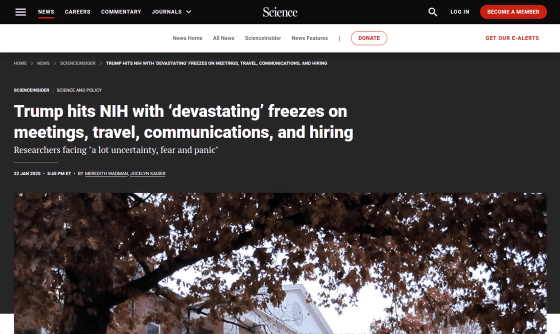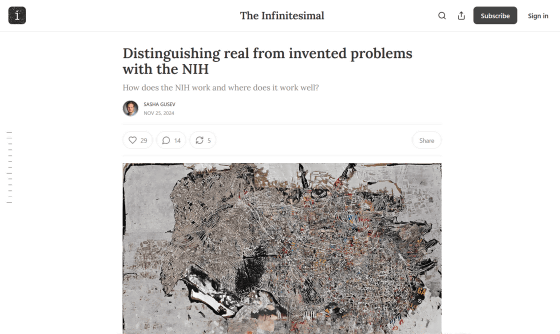With President Trump inauguration, scientists at the National Institutes of Health (NIH) are facing chaos, including the cancellation of meetings and business trips

Donald Trump, who became the 47th President of the United States on January 20, 2025, has appointed Jay
Trump hits NIH with 'devastating' freezes on meetings, travel, communications, and hiring | Science | AAAS
https://www.science.org/content/article/trump-hits-nih-devastating-freezes-meetings-travel-communications-and-hiring

For Trump and his supporters, the NIH has become a target for reform, and on January 22nd local time, a training workshop for young scientists was canceled at the NIH, a workshop on youth learning was canceled minutes before it was to begin, and two advisory committee meetings were also canceled. One committee that was scheduled to review a new grant application was also canceled at the 11th hour.
'This kind of confusion could have long-lasting effects,' said Jane Liebschutz, an opioid addiction researcher at the University of Pittsburgh. 'Even a short delay could put the U.S. behind in research.' She and other researchers say they're feeling a lot of anxiety, fear and panic.
Additionally, the Department of Health and Human Services announced a moratorium on public communications until February 1. This includes suspending any new regulations or guidance announcements, grant reporting, social media posts, press releases, or other public 'communications,' and canceling speaking engagements. An NIH spokesperson said, 'This is a short-term pause while a new team sets up a review and prioritization process.'
Due to the communication halt, meetings in various research departments and committees have also been canceled. NIH is responsible for receiving grant applications for research from various outside researchers, reviewing their proposals, and providing grants, and the review is conducted in closed committee meetings. Therefore, the communication halt will also affect the provision of grants to research projects.

The NIH, like the rest of the government, has also imposed a hiring freeze, while travel has been suspended at its parent agency, the Department of Health and Human Services. The NIH travel director sent an email to senior staff early on the morning of January 22 informing them that all travel was being suspended 'immediately and indefinitely' across the entire Department of Health and Human Services, with some exceptions, such as returning from a business trip.
The measure means that scientists can no longer pursue programs at NIH research institutes outside of NIH facilities, visit distant NIH branches, or attend external conferences to present research results. The travel ban has been particularly disconcerting for junior scientists, with one scientist commenting, 'People are at a loss because they don't know what's going to happen next. I've never seen so much confusion and concern among people who are so dedicated to their mission.'
Previous administrations also imposed restrictions on travel and communications within the first few days of their inauguration, but it is unusual for the Trump administration to completely ban travel. One veteran NIH researcher said these restrictions have been particularly hard on postdoctoral fellows and graduate students, whose careers depend on publishing their research and building networks.
The directives have also worried the NIH-supported research community outside of campuses. 'We haven't heard anything concrete from the NIH yet, but we're anxiously waiting, like everyone in science,' said a scientist at one major academic medical center.
Distinguishing real from invented problems with the NIH
https://theinfinitesimal.substack.com/p/distinguishing-real-from-invented

Although the NIH conducts various research projects as a research institute itself, only 35% of the total budget is allocated to research conducted by the NIH itself, and 60% is provided as grants to external research projects. The remaining few percent is used for administrative expenses and support costs.
When NIH receives a grant proposal from a researcher, the proposal is sent to a 'research section' in a specific field, which consists of several dozen members, and the proposal is reviewed at a meeting of this research section. This meeting is held several times a year, and it is decided how much of the grant will be allocated. Only less than 10% of proposals are awarded, 90% of proposals are not funded at the first review, and even if the proposal is rewritten, the percentage of the grant that can be awarded is less than 20%.
After Trump was elected president, there were a number of issues cited that needed to be reformed at the NIH, but Gusev outlined some of the issues he believes are 'misguided ideas that are gaining momentum.'

By Gage Skidmore
Some of the funded studies have ridiculous names
Politicians may look for proposals like 'insect sex' or 'administering drugs to monkeys' and dismiss them as useless research. But research using these model organisms is important to the scientific process, and many breakthroughs that can later be applied to humans have come from animal research. Research that has already been funded has been proven useful by beating out the remaining 80-90% of the competition, so it is by no means 'silly research.'
There are too many pages of suggestions
Grant proposals are indeed quite long, with the last one Gusev submitted being about 150 pages long. However, the scientific section on which scientists focus is only about 12 pages, and the rest is budgets, resumes of relevant staff, descriptions of data and resources, and contracts between NIH and research institutions. These are compiled by professional grant managers in just a few hours, and reviewers do not always read them, only accessing them in some cases where detailed information is required. Therefore, Gusev argues that this is not an institutional failure that needs to be reformed.
- Lack of funding for 'taboo' research
In November 2024, Harvard economist Roland Fryer argued that 'research should be conducted without taboo on the genetic causes of health disparities.' This attracted a lot of attention, but in fact the NIH provides a significant amount of funding for a number of programs on genetic disparities in health disparities. In addition, a study published in the scientific journal Nature Neuroscience in May 2024 analyzed the brains of African Americans to analyze differences in genetic ancestry, and the data on which this study was based was also collected as part of a clinical trial conducted by the NIH. Gusev explained that Fryer may have thought that 'studying genetic causes between populations is not being studied fairly because it violates the taboos of liberals and political correctness,' but in fact this type of research would be greatly supported if it was carried out rigorously.
NIH should be dismantled and rebuilt from scratch.
Surprisingly, after listing some of the problems with the NIH, many people argue that the NIH should be abolished or completely cut off from funding. However, the NIH supports more than 300,000 people at more than 2,500 hospitals, medical schools, universities, and other research institutions across the United States, and at the time of writing, many studies are being conducted both inside and outside the NIH. Stopping this funding would deal a major blow to American research, not only losing billions of dollars in economic activity, but also putting the country at a strategic disadvantage against other countries. While acknowledging that there are certainly some reforms that need to be made, such as 'black researchers are less likely to receive grants than white researchers,' Gusev argued that there is no point in dismantling everything.

Related Posts:
in Note, Posted by log1h_ik







